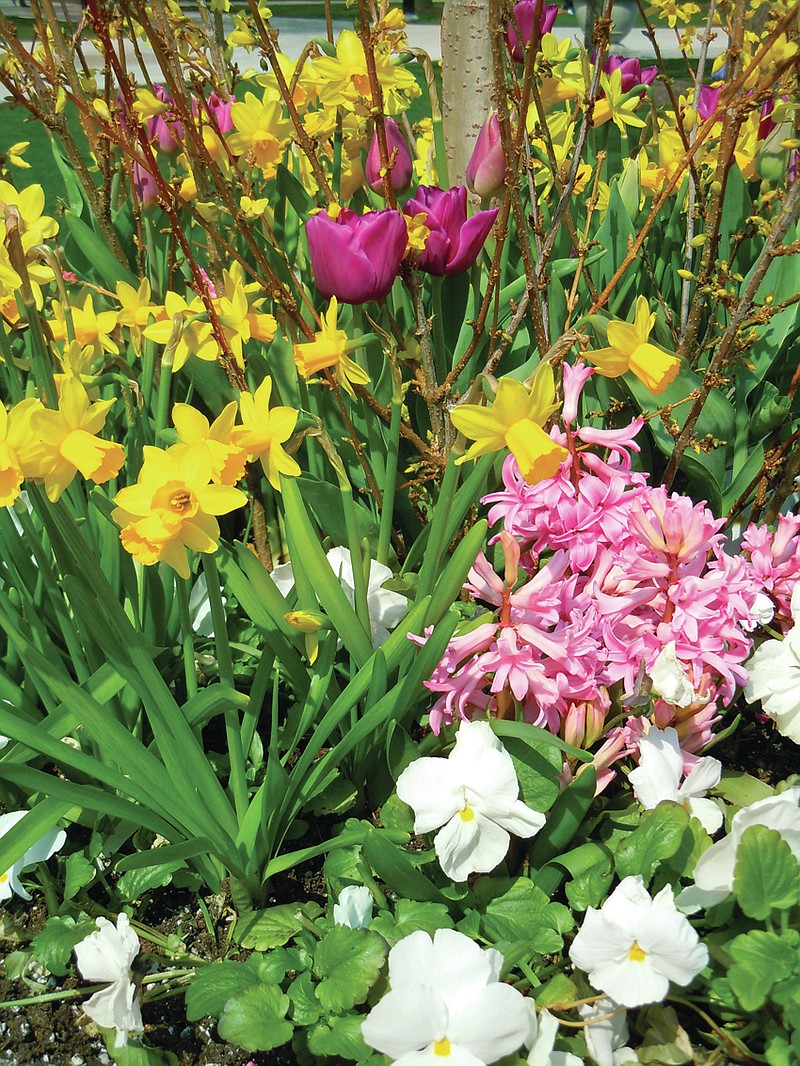Spring is starting in earnest with a warmer February than anticipated! This has led us to a faster onset of our landscapes, which is changing some of the timelines on our landscape chores.
Lawns
As long as your grass isn't growing in spots with some real shade, it looks like they all are greening up right now, which will make applying some herbicides to control weeds untenable at this point. Additionally, in a lot of areas, the cool-season annual weeds are flowering or putting on seed heads, which also makes the herbicides ineffective at this point. If you are already having trouble with some of these weeds (spring beauty, annual bluegrass, henbit, dead nettle) your best bet would be to just mow them down and try to time it better next year if you missed it this year.
The typical lawns in Arkansas are one of the following warm season turfgrasses or a combination of them: Bermuda grass, centipede grass, St. Augustine grass, and zoysia grass. Now is not the time to fertilize these warm-season grasses, as they aren't actively growing yet. If these grasses are fertilized now, then the weeds would receive more benefits than the grass. Additionally, taking a soil sample and bringing it to the Garland County Cooperative Extension Service Office at 210 Woodbine St. is a free service offered by the Division of Agriculture that will help determine if your lawn needs to be fertilized. To take a soil sample you just need to go down as deep as you can (if the rocks of this county will allow it) to a depth of 6 to 8 inches, but if your soil is only 3 to 4 inches deep, that is fine. Collect soil from multiple locations in your lawn (also applies to garden or pasture) in a zigzag pattern until you have a pint of soil. This soil needs to be dried before it is brought to the office to be sent off for analysis and this can be done by leaving the soil out on some newspaper in your garage.
The active growing and optimal fertilization times are typically from June to August. Bermuda grass is a more aggressive and active grass and can often be fertilized as early as May and as late as September. Cool-season lawns such as annual ryegrass and tall fescue should be fertilized in the fall. The University of Arkansas has a fact sheet that helps with fertilization in detail:
https://tinyurl.com/yc3wsedr
Trees
The time for pruning trees is coming to an end, but now is still an OK time to prune your trees. I'd recommend that March be the end of major pruning, unless your trees get damaged. Pruning is good for your trees, as it helps in a variety of ways, including developing strong tree structure, allowing light penetration and airflow to promote growth and reduce disease pressure, controlling tree size, and removing damaged wood. Pruning at this time of year allows you to easily see the structure of the tree better, as it hasn't leafed out yet, which will make seeing what needs to be pruned much more difficult. Summer pruning should be done to control growth of young trees, to remove water sprouts, and to remove undesirable wood. Pruning is also done to eliminate hazards such branches blocking sidewalks, roads, signs, or mowing paths. For more information, visit the University of Arkansas Division of Agriculture's website at uada.edu and search for "pruning" or use the following links:
https://tinyurl.com/yc3mfs73
https://tinyurl.com/5t4chve6
Garden
If you haven't already started your summer vegetable transplants indoors, now is a great time to do so. Tomatoes, eggplants, and peppers can all be started and be ready to plant by mid-April. Spring vegetables can be transplanted and seeded. Transplanted vegetables include broccoli, cabbage, cauliflower, Swiss chard, onions, and kohlrabi. Potatoes can also be planted at this time. Seeded vegetables include carrots, sweet corn, beets, radishes, lettuce, mustard, turnips, and spinach. If you are transplanting any vegetables make sure to set them out and harden them off (getting them used to the outdoor environment) before fully just letting them, go and planting them in the yard. Now is a good time to get asparagus in the ground as well, since it's a great perennial crop that comes back every year. It takes three years to get a good harvest off of asparagus so the best time to plant it was three years ago and the next best time is now! It's one of my favorites and it does great here.
Ornamentals
If you need fast color this month, there are some short-season color plants that can planted right now that include English primrose, calendula, ranunculus, dianthus, snapdragons, and roses, just to name a few. If you have any bulbs popping up now try to wait six weeks before cutting or mowing the foliage back as this will allow them to establish some healthy growth for next year. Bulbs such as daffodils and crocuses typically come back, but tulips should be replanted every year for the healthiest and best-looking blooms. Now is a good time to divide the fall-blooming perennials like hostas, chrysanthemums, sedums, ornamental grasses, shasta daisies, black-eyed Susans, aster, and phlox.
4-H information
There are 4-H clubs for Garland County young people who are 5 to 19 years old. For more information on all the fun 4-H activities that are available, call Sara Jackson at 501-623-6841 or email her at [email protected].
Master Gardener information
Master Gardener meetings are held on the third Thursday of each month at the Elks Lodge. They're open to the public and guests are welcome. For more information, call Arin Shaffer, horticulture agent, at 501-623-6841 or email him at [email protected].
EHC information
Are you interested in joining an existing Extension Homemakers Club? EHC is the largest volunteer organization in the state. For information on EHC, call Alison Crane, family and consumer sciences agent, at 501-623-6841 or email her at [email protected].

